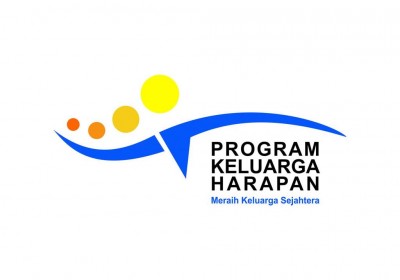Indonesian Conditional Cash Transfer Program PKH: Solution for Solving Economic Gap
June 27, 2018
The logo of Program Keluarga Harapan
Uswatun Hasanah, a resident of Jalan Sungai Biru Laut, Banjarmasin city, was joyful when lifting a trophy of Independent Welfare from Program Keluarga Harapan (Hope Family Program/ PKH). The award was given by the Ministry for Social Affairs of the Republic of Indonesia in the Human Resources Consolidation of the PKH in Banjarmasin, Sunday, beginning of June.
The woman with the headscarf said that she got the social assistance of the Program Keluarga Harapan (PKH) in 2016. At that time, she had been opening flower arranging business for brides at her house but hadn’t been developing well because of limited capital. The PKH is a policy of giving social aid for Benefit Recipient Family under some conditions. This is one of the efforts to accelerate poverty countermeasures.
“I used the money from the Program to finance kids’ schools. While the money that I once used for their school fees are set aside for adding the business capital,” she said as quoted from a press release from the Ministry for Social Affairs.
A year went by. She was now able to buy a refrigerator to keep potpourri flowers. The products from her business keep growing as more orders come in. Now, she has had 10 employees to help her fulfilling orders of arranging flowers.
Besides Uswatun, a symbolic award giving was also given to Yuliatin, Diana Kusnarti, and Jamaliyah for their achievements. They have various home businesses with the satisfying turnover. Some run laundry businesses; others produce fried onions and run groceries.
General Director of the Social Protection and Security, Harry Hikmat, said these women had been said independently graduated. Independent graduation or voluntarily leaving as the member of the Program refers to the self-awareness of the already prosperous Benefit Recipient Family. This is because the Family enjoys better economic condition.
“The achievement deserves our appreciation thanks to hardworking from all parties. There is an accomplishment supported by the awareness of the women of the Family. They are now prosperous and independent,” the Director said after handing the trophy for Uswatun.
According to a survey from the Finance Ministry in September 2017, the Program social aid brings significant impacts to lower poverty and imbalance rate. The first three years of the tenure of President Joko Widodo and Vice President Jusuf Kalla, the poverty level is down to 10.64 per cent from 10.96 per cent. In the same period, the gap level as reflected from Gini Ratio goes down to 0.393 from 0.408.
The number of the Benefit Recipient Family keeps rising every year. In 2015, the amount of the Benefit Recipient Family is only 3.5 million than in 2017, the number is up to 6 million. The targeted number of the Benefit Recipient Family is 10 million in 2018.
As quoted from the official page of the Ministry for Social Affairs, the Program which is internationally known as Conditional Cash Transfers (CCT) is proven to have helped to tackle poverty problems faced by countries, particularly on acute poverty issues.
As one of the conditional social assistance, the Program opens access for poor families to make use of various health and education service facilities that are available around them. People with disabilities and senior residents also start utilizing the Program.
The World Bank regards the prioritized national program as a project with the most effective funding to reduce poverty and gap levels among poor groups. The Program is a project that has the highest efficiency level toward the Gini Ratio decrease.
Other researches reveal that the Program is able to take the Benefit Recipient Family out of poverty, improve family consumption. At the larger scale, the Program is capable of pushing stakeholders at the central and local levels repairing health and education infrastructures.
The Program is stated in the National Medium Term Development Plan 2015-2019. To net solutions as materials to compose the National Medium Term Development Plan 2020- 2024, the National Development and Planning Agency or Bappenas holds Indonesia Development Forum 2018 carrying a theme called “Pathways to Tackle Regional Disparities across the Archipelago”.
Supported by the Australian Government through Knowledge Sector Initiative, IDF 2018 drives accelerated development in Indonesia to be more equal and more sustainable based on knowledge, experience and fact.**
Indonesia’s Research Institutions Supporting the Development of the Electric Vehicle Industry
Indonesian Muslim Fashion and Cosmetics IKMs Shine at Dubai World Expo 2020
Govt Steps Up UMKM Transformation Efforts in the Midst of Pandemic Slowdown
Govt Encourages Promotion of IKM Products in Digital Era
Government Begins Developing Maritime Training Center in Makassar
Tweets by IDDevForum
